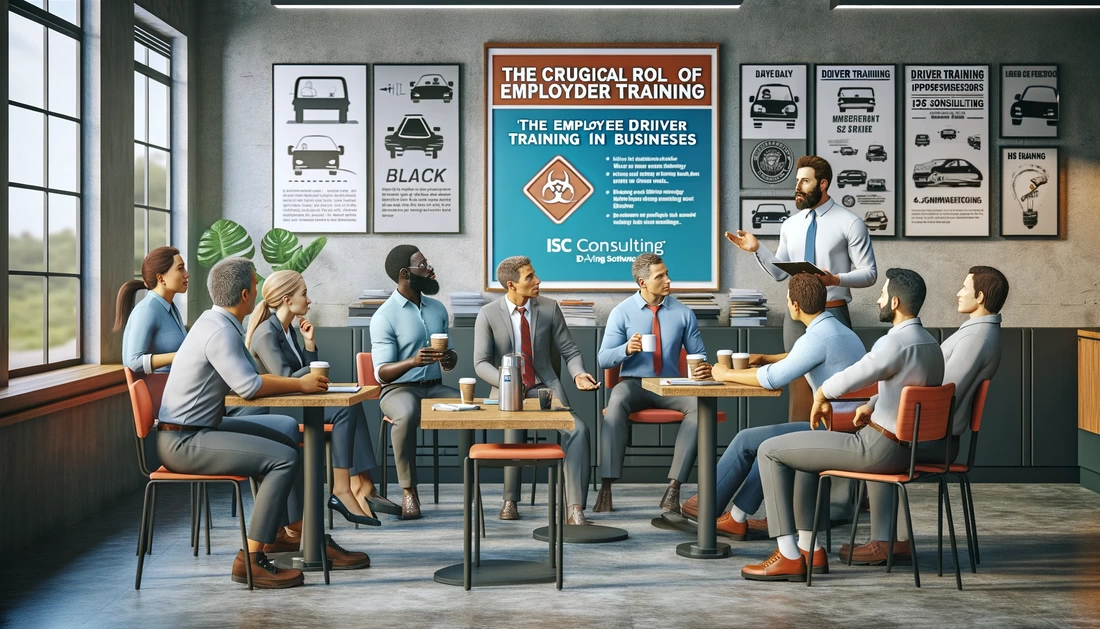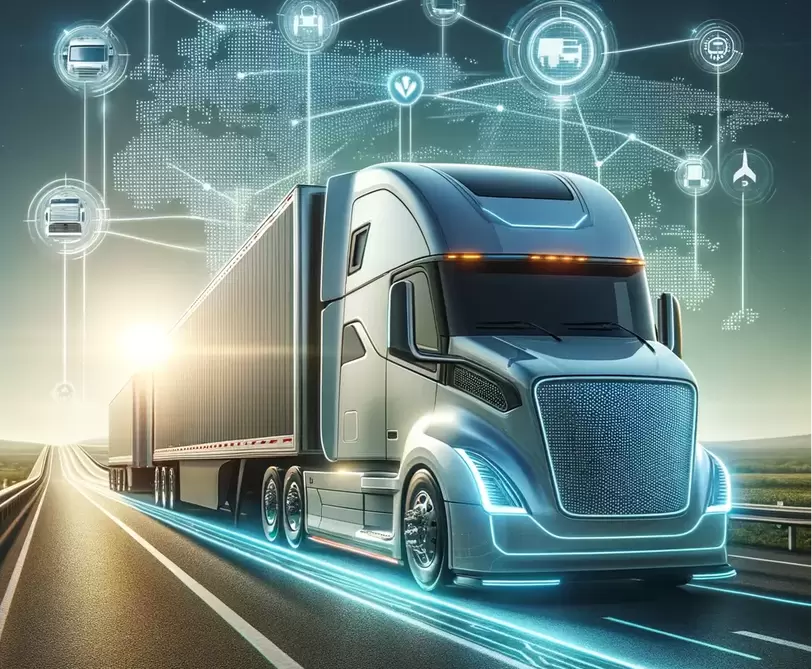|
Welcoming 2024: A Commitment to Enhanced Safety in Trucking As we usher in the year 2024, it's a pivotal time for your trucking company to reinforce and elevate its dedication to safety. The new year brings an opportunity to reflect, innovate, and strengthen safety practices, ensuring the well-being of your drivers and contributing positively to public safety. Reflecting on 2023: Learning and Growing The journey towards improved safety begins with a review of the past year. Analyze the challenges and successes of 2023, understanding where your safety strategies succeeded and where there's room for improvement. This evaluation is a springboard for the advancements we plan for the new year. Setting Ambitious Safety Goals for 2024 In 2024, let's aim for clear and achievable safety goals. Focus on reducing accident rates, improving driver health and well-being, and enhancing emergency preparedness. These objectives should be specific, measurable, and tailored to the unique needs of your trucking operations. Prioritizing Driver Training and Wellness Driver education is a cornerstone of your 2024 safety strategy. This year, invest in comprehensive training covering advanced driving techniques, health and wellness education, and stress management. A well-trained, physically, and mentally healthy driver is a key component of a safer trucking operation. Advancing Fleet Safety Standards Regular vehicle maintenance and incorporating the latest safety technologies are paramount. This year, focus on systematic vehicle inspections and integrating safety features such as advanced braking systems and stability controls. These are not just upgrades to your fleet; they're investments in safety and reliability. Embracing Safety Technology Technological advancements are invaluable allies in your safety journey. Adopting state-of-the-art telematics, collision avoidance systems, and electronic logging will not only safeguard your drivers but also streamline your operations. Cultivating a Culture of Safety Safety transcends policies; it's about cultivating a culture. In 2024, foster an environment where safety is everyone's responsibility. Regular safety meetings, open dialogues about safety concerns, and recognizing safety-conscious behaviors are crucial steps in building this culture. Going Beyond Compliance: Environmental and Community Responsibility Your commitment to safety also involves caring for the environment and the community. Adopting eco-friendly practices and ensuring the safe transportation of goods demonstrate your role as a responsible and community-conscious company. Steering Towards Safer Roads As we conclude, it's crucial to recognize that achieving these lofty safety goals can be a complex and challenging journey. This is where Illinois Safety Consultants comes into play. Our expertise in safety management and driver training makes us an ideal partner in your quest for a safer, more efficient trucking operation. Don't let the challenges of safety compliance and operational efficiency overwhelm you. Reach out to Illinois Safety Consulting today. Let us help you transform your safety vision into reality, ensuring that your company not only meets but exceeds industry standards. Together, we can create a safer future for your fleet, your drivers, and the communities you serve. Contact Illinois Safety Consultants now, and take the first step towards a safer, more prosperous 2024 in trucking. Let's make safety not just a priority, but a reality.
0 Comments
For lawn care business owners, understanding the Department of Transportation (DOT) regulations is not just a legal requirement but a cornerstone of operational safety. This blog explores why and how your lawn care business should comply with DOT authority for both vehicles and drivers. Why DOT Compliance Matters
While compliance can be challenging, especially for small businesses, solutions include:
 From fleet managers to delivery services, many companies rely on employees who drive as part of their job roles. As road conditions, vehicle technologies, and regulations evolve, so does the importance of ensuring that your employees receive comprehensive driver training. Here's why employee driver training is important—it's an investment in safety, efficiency, and the long-term success of your business. 1. Enhancing Safety for All: Above all, safety is paramount. According to the Occupational Safety and Health Administration (OSHA), motor vehicle crashes cost employers billions annually in medical care, legal expenses, property damage, and lost productivity. Proper driver training significantly reduces the likelihood of accidents, ensuring not just the safety of your employees but also of other road users. 2. Building Brand Reputation: Every time an employee drives a company-branded vehicle, they represent your brand. How they drive can affect your company's reputation. Safe, courteous drivers can enhance your company's image, while aggressive or negligent driving can tarnish it. With proper training, employees can become ambassadors of your brand even when they're on the road. 3. Reducing Operational Costs: Well-trained drivers tend to drive more efficiently, leading to reduced fuel consumption. They're also less likely to be involved in accidents, which means lower repair costs and insurance premiums. Investing in driver training can thus lead to substantial long-term savings. 4. Keeping Up with Regulations: Traffic laws and regulations are continually evolving. Regular driver training ensures that your employees are always up-to-date with the latest rules, helping you avoid potential legal complications and fines. 5. Reducing Liability: In the unfortunate event of an accident, a company can find itself in legal hot water. Demonstrable investment in driver training can serve as evidence that the company prioritized safety, potentially mitigating liability. 6. Boosting Employee Morale and Retention: Providing training shows employees that you value and invest in their professional development. Drivers who receive training are more confident, less stressed, and often more satisfied with their jobs, leading to higher retention rates. Employee driver training is not just a formality—it's a strategic move that brings tangible benefits to your business. By investing in training, you're not only enhancing safety but also improving efficiency, saving costs, and bolstering your company's reputation. In the fast-paced world of business, ensuring that your drivers are trained, confident, and safe on the road is not just a responsibility; it's a pathway to success. For further insights into how Illinois Safety Consultants driver training can elevate driver competency and safety, safeguard your fleet's safety rating, and ensure alignment with DOT regulations, please reach out to our team today.
The trucking industry stands on the precipice of a transformative revolution with the emergence of autonomous trucks. The integration of self-driving technology has the potential to reshape the way goods are transported, impacting various aspects of the trucking industry. From enhanced efficiency and safety to workforce changes and supply chain transformations, the effects of autonomous trucks are poised to be far-reaching. Let's explore how these innovations could reshape the trucking industry. Improved Efficiency and Cost Savings: Autonomous trucks hold the promise of revolutionizing operational efficiency and reducing costs. With self-driving capabilities, trucks can operate continuously, eliminating the need for mandated rest breaks and optimizing delivery schedules. Furthermore, autonomous technology enables optimized route planning, reducing fuel consumption, and minimizing idle time. These efficiency gains translate into significant cost savings for trucking companies, enhancing profitability and competitiveness. Enhanced Safety: Safety is a top priority in the trucking industry, and autonomous trucks have the potential to make significant strides in this area. Human error is a leading cause of accidents, but self-driving technology can greatly mitigate this risk. Equipped with advanced sensors, cameras, and sophisticated algorithms, autonomous trucks can detect potential hazards and respond more swiftly than human drivers. By reducing accidents and promoting safer driving practices, autonomous trucks have the potential to save lives and make our roads safer. Workforce Changes and Job Displacement: Autonomous trucks may bring about changes in the trucking industry's workforce. While initial implementations may still require human presence in the vehicle, the long-term impact could lead to shifts in job roles and a potential reduction in the demand for traditional truck drivers. However, new job opportunities may emerge in areas such as remote monitoring, maintenance of autonomous fleets, and oversight of operations. Ensuring a smooth transition and providing support systems for displaced workers will be crucial during this transformation. Regulatory and Legal Considerations: The introduction of autonomous trucks necessitates the development of appropriate regulations and legal frameworks. Governments and industry stakeholders must address key issues such as liability, safety standards, licensing requirements, and the integration of autonomous vehicles into existing transportation systems. Collaborative efforts are essential to establish comprehensive regulatory frameworks that balance safety, innovation, and societal needs. Supply Chain and Logistics Transformations: Autonomous trucks have the potential to revolutionize the entire supply chain and logistics industry. Advanced tracking and monitoring systems, integrated with self-driving technology, can provide real-time insights into shipments, optimize routes, and improve overall supply chain efficiency. Faster and more reliable deliveries can enhance customer satisfaction, reduce inventory costs, and streamline operations. The integration of autonomous trucks with emerging technologies like the Internet of Things (IoT) and blockchain can further enhance visibility and traceability throughout the supply chain. Autonomous trucks are poised to revolutionize the trucking industry, offering significant benefits such as improved efficiency, enhanced safety, and transformative changes in supply chain logistics. However, their widespread adoption will require careful planning, collaboration, and regulatory frameworks to address challenges and ensure a smooth transition. Until that time is reached Illinois Safety Consultants mission is to help trucking companies stay safe on the road, compliant with DOT regulations, and reduce driver accidents. The box truck business offers a versatile and profitable opportunity for aspiring entrepreneurs. With the rise of e-commerce and the need for efficient logistics, starting a box truck business can be a lucrative venture. However, like any other business, it requires careful planning and consideration. In this blog, we will explore the three essential elements you need to establish a successful box truck business. 1. Reliable Box Truck and Equipment The backbone of your box truck business is, of course, the vehicle itself. A reliable box truck is essential for transporting goods and ensuring timely deliveries. Here are some factors to consider when selecting a box truck:
2. Proper Licensing and Insurance Operating a box truck business requires specific licenses and insurance coverage to comply with legal regulations and protect your business. Here are some key aspects to consider:
3. Reliable Clientele and Marketing Strategy Establishing a customer base is crucial for the success of your box truck business. Consider the following steps to attract and retain clients:
Conclusion Starting a box truck business can be a rewarding endeavor if you plan carefully and execute your strategies effectively. Remember the three essential elements: a reliable box truck and equipment, proper licensing and insurance, and a strong marketing strategy. By focusing on these key areas, you can establish a successful box truck business that provides efficient transportation services and meets the growing demand in today's logistics landscape. Truck driving can be a dangerous profession, and the risks can vary depending on the location. Here are some cities that have been identified as having higher rates of accidents and safety concerns for truck drivers:
Distracted driving and cell phones
This post features affiliate links, meaning will earn a small commission if you purchase through these links. How often do you check your phone when driving? Phones are designed to be addicting. In an interview on 60 Minutes, a former Google product manager said Silicon Valley is engineering your phone, apps and social media to get you hooked. Users feel the need to check it constantly. Some programmers call it “Brain Hacking”. In a 2018 report by Common Sense Media, 47% of parents felt their children are addicted to their mobile devices, and 32% describes themselves as addicted too. With people feeling the need to check their phone constantly even while driving, it causes them to be distracted, which increases the risk of accidents. This includes truck drivers. US DOT prohibits the use of hand-held phones while driving a commercial motor vehicle. To reduce risks, drivers can wear Bluetooth headsets. The best solution would be waiting to you are stopped or parked at a safe location to look at your phone. Road to Zero is a collaboration focused on ending traffic fatalities—a leading cause of unintentional death—on our roadways within 30 years. The goal is safe mobility for all people, and members will work to develop priorities; take action individually and collaboratively; and encourage partners and stakeholders to take action to meet the goal of eliminating traffic fatalities by 2050.
It might seem like a lofty goal, but key stakeholders believe it is possible. “The aim of Road to Zero is to get to zero deaths by 2050,” says Debbie Hersman, the president and CEO of the National Safety Council, the lead on the Road to Zero initiative. “That’s the goal. We’ve done this with aviation—there have been several years with zero deaths in commercial aviation—and a lot of people thought that was impossible. We’re really focused on incorporating all of the initiatives that we’ve seen through Toward Zero Deaths, Vision Zero and a number of different groups to get to zero.” Illinois Safety Consultants is pleased to join the Road to Zero Coalition working to make our roads safer. |
AuthorAt Illinois Safety Consultants we are dedicated to helping improve safety in the transportation industry. Archives
November 2023
CategoriesAffiliate Disclosure
As an Amazon Associate I earn from qualifying purchases. |




 RSS Feed
RSS Feed